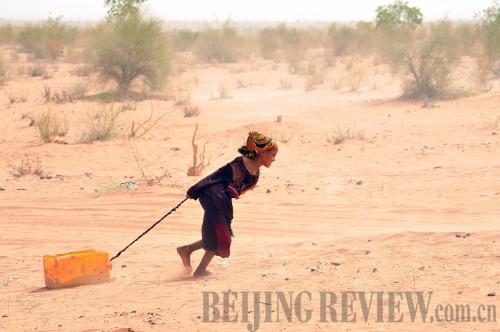|
 |
|
DESERTIFICATION: A child walks in a desert area near the Mbera refugee camp in south Mauritania on May 3 (XINHUA/AFP) |
Criticisms aside, there were also constructive views voiced over the North-South confrontation. Sha Zukang, Secretary General of Rio+20 and UN Under Secretary General for Economic and Social Affairs, pointed out that although the argument between the North and the South was becoming intense, the ultimate goals of sustainable development should bridge the gap between the North and the South, rather than erecting a barrier to divide them.
He Jikun, Chairman of the Chinese Society for Sustainable Development, an NGO that hosted a workshop on the sidelines of the Rio+20 conference, also called for closer international cooperation in dealing with the challenges, saying it would be in everyone's best interest for people from different countries to join hands to create a better world.
Mixed reactions
For a moment, pessimism reigned over Rio de Janeiro. Seeing the hard bargains and unfulfilled commitments, and considering the non-binding nature of the outcome document, the Future We Want, a large number of participants believed the future for sustainable development would be quite uncertain.
Chandra Tamirisa, CEO of Transformations LLC., an independent consulting firm in Washington, D.C., expressed his doubts. "It would be interesting to see how the UN will coordinate the nations and push them."
Others simply gave up completely. "The Rio summit will not bring about 'the future we want.' It will provide a stark and distressing reminder of the present we have," said Kumi Naidoo, Executive Director of Greenpeace International.
There was also positive assessment. Some people said the conference would become another historical landmark. In addition to the adoption of the final document, the conference offered a good opportunity for countries around the world to look back at what they had achieved, realize why they had failed, and discuss what should be done in the future. "The meeting has brought to our attention something we are all concerned about, and also has come up with something encouraging and constructive," said Kline. "Something is always better than nothing."
The final draft of the outcome document was generally inclusive, balanced and set in a positive tone, said Chinese Assistant Foreign Minister Ma Zhaoxu after the document was agreed upon following rounds of hard talks on June 19. It addressed the major concerns of all parties, and will play an important role in promoting global sustainable development, he added.
The document reiterated the principled stances at the 1992 Earth Summit, in particular, the principle of "common but differentiated responsibilities." With regard to green economy, Ma said the document called for respecting each country's sovereignty, national conditions, as well as development stage, and attaching greater importance to eradicating poverty around the world.
The document urged developed countries to fulfill their commitments to helping developing countries. These include providing to the developing world aid of up to 0.7 percent of their gross national product, extending environmentally friendly technology transfers under favorable terms to developing nations, and helping them build capacity, Ma said.
But as to the development in future, many believed it depends on how determined countries around the globe are to act for change.
(Reporting from Rio de Janeiro)
| 